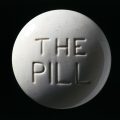When I was 28 years old, I had a massive stroke (a cerebral venous thrombosis in the sagittal sinus area) from a combination of birth control pills and a fairly common clotting disorder, Factor V Leiden. You can read the first part of my story here.
Recovering from a Stroke
The repercussions of what having a stroke meant began to sink in after I was moved out of the intensive care unit.
Once in a regular hospital room, a therapist came by to do some tests. She pulled my blankets aside and asked me if I could take off my sock. This test seemed ridiculously easy, but I was willing, just happy that my head no longer hurt. I leaned forward and confidently pulled the sock off my foot. “Great,” she said. “Now put it back on.” So I put the sock back on my foot. Only I didn’t. Because I couldn’t. I stared at the sock in my hand and then I stared at my foot, knowing that I should be able to complete such a simple task, yet unable to.
This was the first of thousands of tests during my recovery. And it was the first of a thousand times when I knew I used to be able to do something that I could no longer do. It is one of the strangest sensations I have ever experienced.
I spent a week in the hospital and another week in an in-patient rehabilitation facility. Before I was discharged to go home (for another month of out-patient rehab), the psychologist told me that things would feel like “Christmas at the mall” instead of say, an ordinary Tuesday afternoon. It was an appropriate analogy for how overwhelming everyday life would be and one that I would come to understand the first time I broke into sobs when I dropped a bowl of cereal on the floor. I was cautioned against trying things like swimming alone, as I might not remember how and accidentally drown myself. They also told me that I had lost millions, maybe billions, of brain cells that I would never get back. And that I might never be able to work a “real” job again.
At home, I set about re-learning things like how to hook my bra, tie my shoes, and wash my own hair. Once I mastered these, I began to wonder what else I could do. I was extremely lucky that I made progress every day, but some days it felt like I’d never be back to normal. I wasn’t sure what normal even was anymore. After the warning from the psychologist, I was scared that I wouldn’t be able to handle a full-time job. And because of the seizures, I could not drive for six months which was devastating and isolating, especially for someone as independent as I had always been. Since I was stuck at home, it seemed like a good time to force myself to relearn math (yet another thing I knew I had been good at but could no longer do). I began to study for the GRE and less than six months later, I was accepted to graduate school.
Searching for Answers
When it came time to write my thesis, I decided to use my stroke as an inspiration for my research. I wanted to know why I had had a stroke, why no one had ever told me the risks involved with taking hormonal birth control, why I never knew there was a possibility that I had a clotting disorder which would greatly increase my risk. In short, I was looking for a smoking gun; someone or something I could point my finger at and say, “Aha! That is where the breakdown occurred. This is who should be blamed!”
But what I found was much more complicated. What my doctors had told me, that I was an anomaly, seemed to be supported by the research that I found. Studies show that most people get a blood clot within a year of starting hormonal birth control. Mine happened 10 years later. I learned that Factor V Leiden is fairly common but that women aren’t tested for it before being prescribed hormones because testing that many women would be expensive. I also found research that said pregnancy is more dangerous than birth control.
Putting aside the false dichotomy that the only two choices a woman has are to be pregnant or be on hormonal birth control, the message I took away from all of my research was that my stroke was an acceptable risk to save countless women from pregnancy. That even though my stroke could have been prevented by a simple blood test before I was even prescribed birth control pills, my value as a human woman was not worth the greater expense. As a child of the 80s and a product of American capitalism, this didn’t shock me as much as it probably should have. After all, I lived in a world of the Ford Pinto. What I didn’t realize at the time and would only come to understand years later, was that I began to internalize the blame for what happened to me. Maybe it was my fault for not knowing the dangers, for not understanding the risks, for being so stressed out that my body failed me.
Was It My Fault?
In researching my thesis, I discovered that pharmaceutical companies intentionally make the risk communication in advertising, and especially in the package with the birth control, dense and confusing. And I also found that women who have taken hormonal birth control don’t adequately understand the potential side effects, nor do they even know the symptoms of blood clots. There is very little accurate information about clotting disorders online. Even if my situation was rare, these facts are extremely troubling. But what I have since come to learn is that my stroke was actually not so rare.
Recently I’ve been contacted by an amazing group of people; researchers, families who have lost their daughters to hormonal birth control, fellow survivors, writers, and scientists. They’ve helped make it clear to me that I’m not just an anomaly. As you can see from the other stories on this site, hormonal birth control has very real, very harmful risks. And we have lost far too many amazing young women to stand idle any longer. Our standard must be higher than accepting these women’s lives as collateral damage. Together with this group of health advocates, we are embarking on a journey to give women what they need-information to make the right choice for them. Because what happened to me was not my fault. It’s time to stop blaming myself. Yet even as I write these words, I still have some doubt. And that doubt shows me that I haven’t fully recovered from my stroke yet. I still have work to do on this journey. And that work may take me the rest of my life. For more on what long-term recovery from a traumatic brain injury looks like, see Part 3 of the series.
Real Risk Study: Birth Control and Blood Clots
Lucine Health Sciences and Hormones Matter are conducting research to investigate the relationship between hormonal birth control and blood clots. If you or a loved one have suffered from a blood clot while using hormonal birth control, please consider participating. We are also looking for participants who have been using hormonal birth control for at least one year and have NOT had a blood clot, as well as women who have NEVER used hormonal birth control. For more information or to participate, click here.














I got my clot in 2016 and got aphasia and pressure in my eyes. Also my blood results APS keep fluctuating so doctors don’t recommend blood thinner for life unless there’s a positive pattern…
Pretty much the same thing with my daughter. She was on birth control and had a massive stroke at age 20.
Keith, I’m so sorry to hear about your daughter. Do you know what kind of hormonal birth control she was using? Our preliminary study is finding some interesting correlations.
Thank you for spreading awareness.
I am 25 years old and just had extensive DVT in my abdomen and a PE in my left lung two months ago and went in the hospital 4 days before my birthday. Fortunately I was only in overnight. I, too, had been on birth control for 10 years before it caused my clots. My mother had 2 PEs right after I started taking the Pill and she’d been on it for about 20 years; hers were also caused by birth control. I was tested for clotting disorders (don’t have Factor V) but my hematologist wants to re-do it in 6 months because my Protein C levels were low, possibly indicating Protein C Deficiency, but he wants to be sure it’s not being influenced by my blood thinner.
We are part of a group that is lucky enough to be around after having something this serious happen to us! I asked God many times during my hospital stay and my immediate recovery why me, why I didn’t die. I guess I’m not done here yet; there’s stuff for me to do still!
Please, please, please keep sharing this information with anyone and everyone. Informing women of choosing birth control options wisely and keeping more progesterone based prevention methods at the top of the list is what we all should be doing!
Thank you for being a voice for all of us women who have had blood clots due to birth control!
Jaye, what a horrible experience. Do you mind me asking if your mother was ever tested for clotting disorders and once she had the PE, did your docs think to test you and any other family members?
No, she wasn’t, and no, they didn’t. If I end up having one, I hope my parents will get tested, though! I’m thinking if I have one, there’s something on my dad’s side.
My mom has done well, though, after taking Coumadin for 3 months and she hasn’t been on it for 10 years (when her clot was) or had any more clots. My doctors told me that I can’t take estrogen anymore and neither will any daughters that I’ll eventually have. I also have ITP, which could be an influencing factor, but in my case, due to my levels, probably not.
Jays, that’s just awful. I’m so sorry you had to go through that. Thank you so much for sharing!
This needs to go viral. Thank you so much for writing this and yes of course I am sharing. Also asking everyone else to share.
My 16 year old daughter died a month after going on the pill. That is when they told me about factor V and the blood test. Now everyone in my immediate family had to get tested and insurance had to pay. I have it and never knew it existed. One of my nieces we now found out has it from both parents. So now insurance has to pay for that whole family to get tested. Instead of paying for one. Better yet, the doctors do not even tell you about it and see if you want to pay out of pocket.
I am not against the pill. I am against people not being told all the facts. They decided my daughters fate and she was the one that lost and became a statistic to them.
Laura, I’m so very sorry to hear about your daughter. That is tragic and completely unacceptable. Thank you for sharing.
This is information that should be shared. You are so inspirational and I look forward to the rest of your story. No one else needs to go through what you’ve gone through! Thanks for sharing!
Thanks Viki!